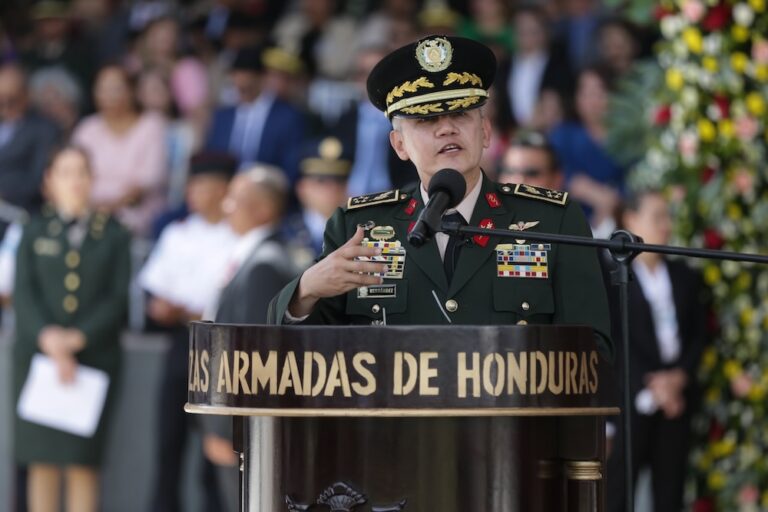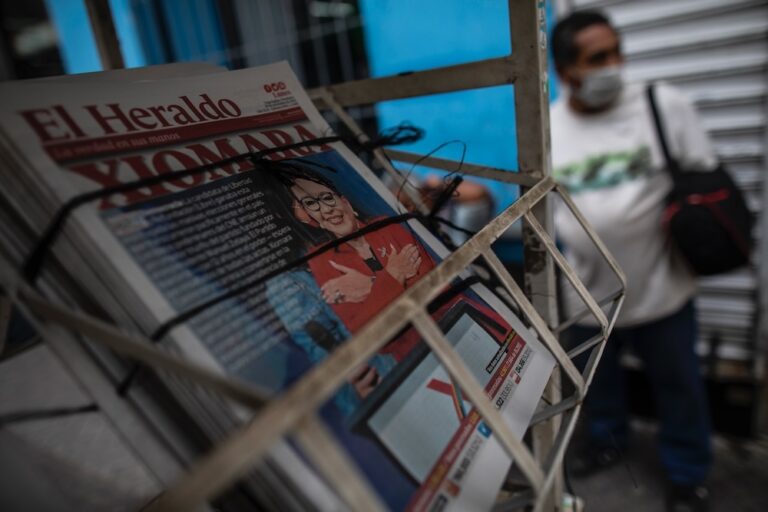On 5 November 2014, the IACHR ordered the Honduran government to suspend a 16-month ban on practising journalism and other penalties imposed on Julio Alvarado. One month after the ruling, the Honduran state has failed to suspend the work ban.
This statement was originally published on pen-international.org on 4 December 2014.
The Honduran authorities must stop their judicial harassment of journalist Julio Ernesto Alvarado, which continues despite legally binding protection measures awarded to him by the Inter-American Commission on Human Rights (IACHR) a month ago – and the presence of the IACHR in Honduras this week, PEN International said today. Alvarado is a founding member of PEN Honduras, established in October 2014.
“The Honduran authorities’ continued judicial harassment of a journalist whose protection has been ordered by the highest regional human rights body in the Americas is a clear violation of his right to freedom of expression,” said Carles Torner, PEN International’s Executive Director.
“We are calling for the government to take immediate steps to implement the precautionary measures by suspending journalist Julio Ernesto Alvarado’s work ban, to inform him and the IACHR of this in writing and to enable him to continue his legitimate work as a journalist without fear of further persecution.”
On 5 November 2014, the IACHR ordered the Honduran government to suspend a 16-month ban on practising journalism and other penalties imposed on Alvarado for alleged criminal defamation of a public official pending investigation of his case by the Commission. The ruling also compels the government to abstain from any action which would inhibit the journalist from practising his profession.
The IACHR gave the government 10 days to implement its ruling. However, one month after the ruling, not only has the Honduran state failed to suspend the work ban but the court which issued the sentence against Alvarado is actively attempting to implement it.
Court officials on two separate occasions yesterday unsuccessfully attempted to serve papers to Alvarado at TV Globo, where he presents the news programme ‘Mi Nación’. This occurred after the Constitutional Section of the Supreme Court of Justice (la Sala de lo Constitucional de la Corte Suprema de Justicia) in Tegucigalpa finally admitted a constitutional challenge (amparo) brought against Alvarado’s sentence in October, but without the requested suspension of the work ban.
This flagrant disregard for the IACHR ruling comes despite the presence of the IACHR in Honduras this week for a country mission ending 5 December. The IACHR’s new Special Rapporteur for Freedom of Expression, Edison Lanza, has already met with Alvarado and his lawyer.
The IACHR’s decision in Alvarado’s case was hailed by PEN International as a landmark ruling and a clear message to governments in the region to protect journalists and guarantee the right to freedom of expression. It is the first time that the IACHR has revoked a ban on a journalist practising his or her profession. PEN International requested the precautionary measures along with the President of PEN Honduras, Dina Meza, and Alvarado’s lawyer and PEN member, Kenia Oliva Cardona.
PEN calls on the IACHR and its Special Rapporteur on Freedom of Expression to do their utmost to ensure that the Honduran government complies with its landmark ruling before they leave the country.
Background
The IACHR’s 5 November 2014 decision to suspend the 16-month work ban and fine imposed on Alvarado follows a complex legal battle between the Honduran Government and the journalist.
A 16-month prison sentence and ban on practising journalism was originally handed down to the director and presenter of Globo TV’s news programme ‘Mi Nación’ in December 2013 due to his coverage in 2006 of alleged corruption by a university dean, Belinda Flores. In April 2014, Alvarado paid a fine in order to lift the 16-month prison sentence and ban on practising journalism. However, Flores appealed and on 22 August the Penal Appeals Court (La Corte de Apelaciones de lo Penal) in Tegucigalpa ruled that the work ban should be reinstated. The ruling was only communicated to Alvarado’s lawyer more than a month later, on 26 September 2014.
On 29 September, Alvarado’s lawyer requested that the court reconsider its decision to reinstate the work ban. This appeal was rejected the very next day, on 30 September – an unprecedentedly rapid ruling in the context of the Honduran justice system, where appeal procedures typically last for months or even years. The notification came just hours after Alvarado and Dina Meza spoke on his TV show about his case and perceived irregularities on the part of the Appeals Court, on the evening of 29 September. However there was again a delay in communicating the ruling to Alvarado’s lawyer, who did not receive notification until 6 October.
On 9 October, Alvarado’s lawyer submitted an application for the implementation of the ruling to be suspended pending review by the Constitutional Section of the Supreme Court of Justice (la Sala de lo Constitucional de la Corte Suprema de Justicia). This action, known in Spanish as an amparo, is a remedy for the protection of constitutional rights where all other routes of appeal have been exhausted.
In the absence of a response, on 17 October, Alvarado, along with other journalists and PEN Honduras members, presented 13 other amparos to the Supreme Court. Procedure dictates that Alvarado’s lawyer and the other petitioners should have received a response to these submissions within 24 hours, but to date the Supreme Court has yet to respond.
The Supreme Court upheld Alvarado’s journalism ban on 7 November 2014.
However, this is overruled by the IACHR’s decision to grant Alvarado precautionary measures.


